|
|
|
Sort Order |
|
|
|
Items / Page
|
|
|
|
|
|
|
| Srl | Item |
| 1 |
ID:
090983
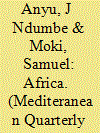

|
|
|
|
|
| Publication |
2009.
|
| Summary/Abstract |
The authors contend that the pervasiveness of piracy on the African coasts is threatening global security. Within Somalia, it is causing a disruption of food supplies, fostering internal conflict, and increasing the prices of basic commodities. Globally, it is orchestrating a dramatic rise in maritime insurance premiums and maritime insecurity, disrupting international commerce, increasing the possibility of an environmental disaster, and encouraging a nervous, emerging relationship with terrorism. Piracy must be stopped. To achieve this objective, the authors recommend revamping the international law on piracy, maintaining adequate coastal security along the hot spots on the African coasts, using military force, establishing safe maritime lanes, training crews on security measures, stationing armed guards on ships, and most importantly, reestablishing political stability in Somalia.
|
|
|
|
|
|
|
|
|
|
|
|
|
|
|
|
| 2 |
ID:
090982
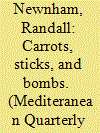

|
|
|
|
|
| Publication |
2009.
|
| Summary/Abstract |
The question of how to deal with so-called rogue states, especially those trying to obtain weapons of mass destruction (WMD), is currently of central importance to the world. Advocates of military action, who predominated immediately after 9/11, have lost credibility in recent years. Yet they have claimed one clear success: Libya's decision to renounce WMD in late 2003. The Bush administration believed that this decision was based largely on fears of US military action. This essay, in contrast, argues that other factors were crucial, notably the impact of years of economic sanctions and the lure of economic incentives. Thus the Libyan case, far from supporting a military approach to "rogue states," in fact argues for a patient policy of diplomacy and economic carrots and sticks.
|
|
|
|
|
|
|
|
|
|
|
|
|
|
|
|
| 3 |
ID:
090979
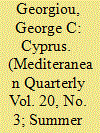

|
|
|
|
|
| Publication |
2009.
|
| Summary/Abstract |
This essay analyzes the economic consequences of the proposed reunification of Cyprus and concludes that, based on the framework presently being negotiated, the much-publicized economic peace dividend will not materialize for the majority of Cypriots. The economic costs and benefits of such an agreement will inevitably be unequally divided, with the Greek-Cypriot majority bearing the brunt of the economic burden with no political or security offset.
|
|
|
|
|
|
|
|
|
|
|
|
|
|
|
|
| 4 |
ID:
090977


|
|
|
|
|
| Publication |
2009.
|
| Summary/Abstract |
The attempt of the Georgian government to reform and restructure its military forces in the past ten years demonstrates the difficulty of conducting Western-style defense reform in postconflict states, which have not seen a formal end to armed conflict. Western-style reforms were intended to bring Georgia greater peace, stability, and accountability, with the added benefit of training additional soldiers to support regional peacekeeping operations. Domestic political imperatives within Georgia, however, demanded that the government restore the territorial integrity of the state by "reintegrating" South Ossetia, Abkhazia, and Adjara. In this context, additional organizational and doctrinal interoperability of Georgian forces was desirable, but only to the extent that it enabled Georgian forces to meet these primary domestic political requirements. For Georgia, a country with a weak military tradition and unresolved domestic conflicts causing political controversy at home, military reform was not just an abstract step toward democracy but a potential means to an end of resolving those same conflicts by force or threat of force.
|
|
|
|
|
|
|
|
|
|
|
|
|
|
|
|
| 5 |
ID:
090981
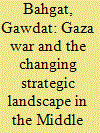

|
|
|
|
|
| Publication |
2009.
|
| Summary/Abstract |
On 27 December 2008, Israeli forces attacked Gaza to stop missile attacks by Hamas. The military operation lasted twenty-two days and ended with a fragile cease-fire. This study seeks to provide an assessment of all involved parties' stances. The author argues that some parties gained more than others, but the operation dealt a heavy blow to an already fragile peace process. Indeed, the Gaza war has further reinforced the current and growing polarization between the Palestinians and the Israelis. The continuing disagreement between the Palestinian factions and the election of a right-wing Israeli government suggest that the prospects for peace in the foreseeable future are dim.
|
|
|
|
|
|
|
|
|
|
|
|
|
|
|
|
| 6 |
ID:
090978


|
|
|
|
|
| Publication |
2009.
|
| Summary/Abstract |
Talk of a "greater" this or that Balkan nation-state has subsided in recent years as the region experienced the creation of ever more minirepublics-a total of eight on the territory of former Yugoslavia. This trend toward fragmentation was initiated by petty nationalists and fostered by the United States and European powers that found it convenient and desirable to dominate and exploit a bunch of fiefdoms. The outside powers reinforced the new system of minirepublics by inviting candidacy in their continental economic organization, the European Union, and their now global security organization, the North Atlantic Treaty Organization. But is "greater" gone forever from the Balkan vocabulary? It might be prudent not to banish the concept. Think of the phrase of the late Willy Brandt spoken in 1989: "Jetzt wächst zusammen was zusammen gehört"-"Now grows together what belongs together." Applied to the Balkans in coming decades the ethnic Albanians now living in at least five Balkan states and the ethnic Serbs living in five states, as well, are developing growing kinship with their fellow nationals beyond the current frontiers and local allegiances that currently separate them.
|
|
|
|
|
|
|
|
|
|
|
|
|
|
|
|
| 7 |
ID:
090975
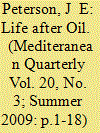

|
|
|
|
|
| Publication |
2009.
|
| Summary/Abstract |
There have been three economic transformations of the Arab Gulf. Yet the obstacles today remain eerily similar to those of forty years ago. Oil reserves are finite and nonoil resources in the gulf states-minerals, arable land, skilled population, and even capital for some countries-are scarce. Thus the path to economic diversification is especially difficult. While half of the six Gulf Cooperation Council countries enjoy sizable surplus income at present, the other three face immediate requirements for replacing oil income. The various strategies chosen to prepare for a viable economic future differ according to the group, and the task is further complicated by authoritarian regimes and inefficient state planning.
|
|
|
|
|
|
|
|
|
|
|
|
|
|
|
|
|
|
|
|
|